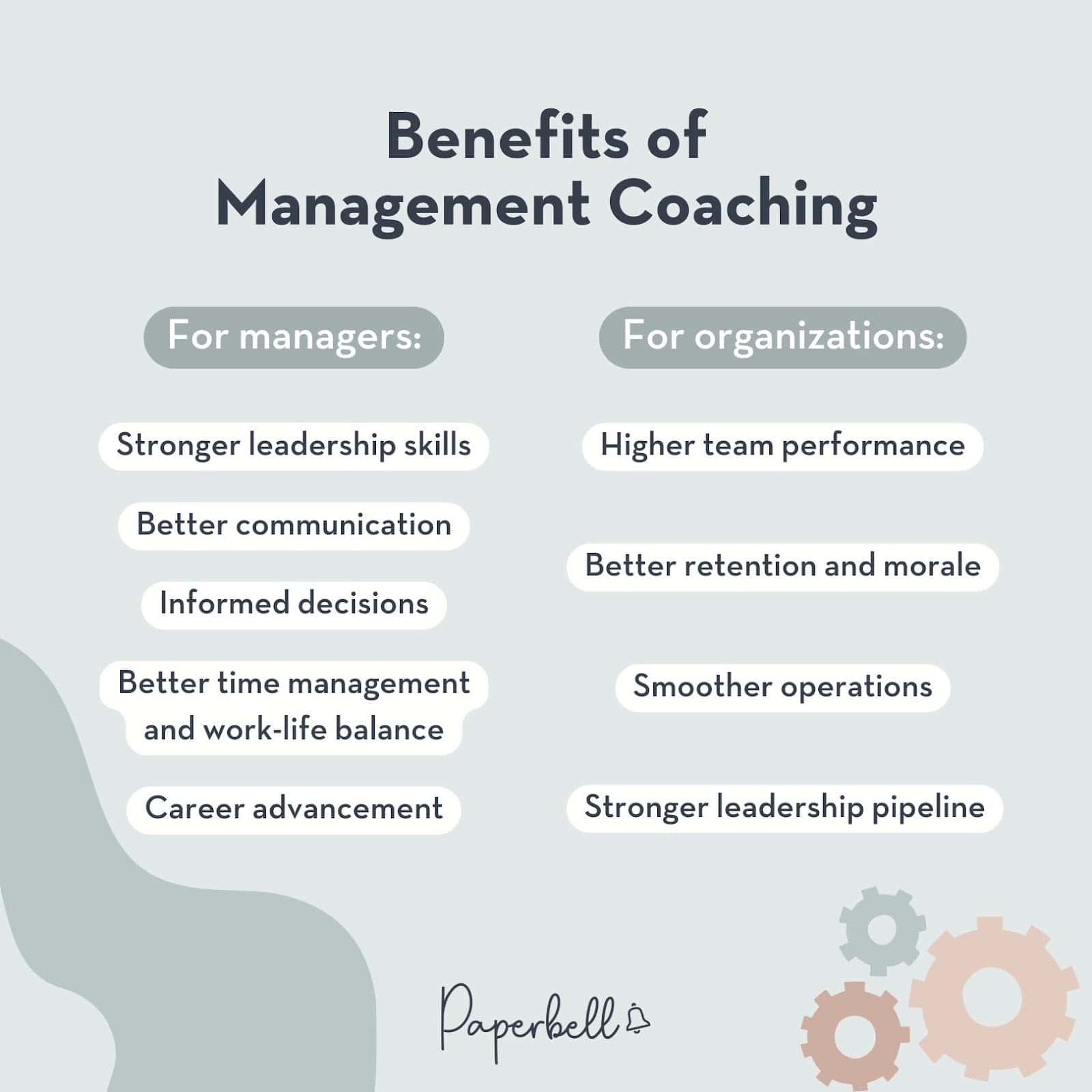Organizational coaching reports one of the highest ROIs in the industry with 86% of organizations seeing coaching services paying off.
Coaches who work with managers can directly impact the leaders who hold companies together. Their impact can ripple into improved team performance, a stronger company culture, and better alignment with organizational objectives.
However, these changes might not always be immediately visible or easily measured. Here’s what you should consider when hiring a management coach—and how you can become effective in this coaching niche yourself.
What Is Management Coaching?
Management coaching is a process where a professional coach helps people in leadership roles develop the skills, mindset, and strategies needed to be effective. It focuses on practical aspects of managing people, processes, and organizational performance.
Management coaches are more than just a sounding board. They work with clients, typically mid-level managers, to improve their ability to:
- Lead teams effectively: Developing communication, delegation, and conflict-resolution skills.
- Manage performance: Setting goals, giving feedback, and handling performance issues.
- Navigate organizational challenges: Balancing team needs with company expectations.
- Improve decision-making: Getting better at problem-solving and strategic thinking.
- Increase self-awareness: Understanding their leadership style and areas for growth.
They do this through regular coaching sessions structured around tangible challenges the manager is facing. They use various coaching tools and accountability systems to help their clients achieve lasting change.
Management coaching is akin to other specialties like leadership and executive coaching. However, coaches in those niches are more likely to focus on developing leadership qualities and high-level strategy than the day-to-day processes of mid-level managers.
The Benefits of Management Coaching
A structured coaching process helps managers succeed in their roles while benefiting the entire organization.
The benefits of coaching for managers:
- Stronger leadership skills: Managers learn how to motivate their teams and delegate responsibilities.
- Better communication: They improve how they deliver feedback and manage difficult conversations.
- Informed decisions: With the right frameworks, managers can uncover blind spots, analyze situations, and make data-driven choices.
- Better time management and work-life balance: They learn to prioritize tasks, set boundaries, and prevent burnout.
- Career advancement: Strengthening their skills and mindset gives them better chances for a promotion.
The benefits of management coaching for organizations:
- Higher team performance: A well-managed team is more engaged, productive, and aligned with company goals.
- Better retention and morale: Good managers reduce turnover by creating a positive and supportive work environment.
- Smoother operations: Strong management helps reduce bottlenecks and streamline workflows.
- Stronger leadership pipeline: Investing in professional development prepares managers to take on bigger roles in the company.
Managers are the bridge between senior leadership and employees. If they struggle, their team and the whole company will suffer too. A management coach can help them gain the clarity and confidence needed to handle challenges.

When to Hire a Management Coach
Investing in management coaching clearly has some perks. However, these benefits aren’t always immediate or easy to quantify.
Companies must assess whether spending on management coaching over other pressing needs will return the investment. Here are some common situations when hiring a management coach is timely and strategic.
1. Employees Transitioning Into Leadership Roles
- A high-performing employee has been promoted into management but lacks leadership experience.
- A new manager is struggling to balance team leadership with their individual responsibilities.
2. Performance Issues
- Managers are having difficulty motivating their teams or handling performance issues.
- Employee engagement surveys indicate low morale, unclear expectations, or ineffective leadership.
- There is high turnover within a department, signaling poor management practices.
3. Larger Organizational Changes
- The company’s rapid growth calls for restructuring or a merger that requires managers to adapt quickly.
- New processes, technologies, or business models are introduced, changing the day-to-day operations of the company.
4. Specific Management Challenges
- Managers have difficulties with communication, delegating new assignments, or conflict resolution.
- Managers and their teams struggle to collaborate or build trust.
- Performance reviews show that managers need to improve in decision-making, prioritization, or problem-solving.
5. Developing a Strong Leadership Pipeline
- The company wants to prepare mid-level managers for senior leadership roles.
- There is a talent gap when it comes to unfilled leadership positions, leaving the company with the costly alternative of hiring from outside.
6. Supporting DEI and Cultural Shifts
- The organization is working toward better diversity, equity, and inclusion (DEI), and managers need coaching to lead diverse teams effectively.
- The company is building a culture of continuous feedback, innovation, or accountability, and managers need guidance on shifting their leadership approach.
How to Hire the Right Management Coach
The right coach can be a good investment for your company. Here are some guidelines for choosing the right professional.
1. Screen for the Right Qualifications
✅ Relevant experience: Do they have a background in management? Have they coached managers in your industry before?
✅ Coaching credentials: While not the only denominator of expertise, relevant certifications can indicate a strong foundation in coaching methodology.
✅ Proven results: Do they have case studies or testimonials from past clients showing tangible improvements?
✅ An approach that fits your needs: Some coaches focus on leadership style, others on hard management skills. Make sure their expertise aligns with your managers’ needs.
2. Interview Them
Next, assess whether the coach is a good fit for your company’s culture and challenges. Here are some interview questions you may use:
- “What’s your coaching process?” This helps you understand what they focus on and how much their process can be adapted to your organization’s needs.
- “Can you share an example of how you helped a manager overcome [challenge]?” Look for concrete experience and solutions in the area your managers struggle with.
- “How do you measure success in your coaching engagements?” An effective coach will have a clear way to track progress, whether through feedback, performance changes, or other metrics.
3. Consider Costs
Coaching fees for managers and senior leaders have a wide spectrum, depending on the coach’s experience and level of involvement. Beyond pricing options, consider the following:
💡 What’s the ROI? If coaching helps managers improve retention and performance within a realistic time frame, their services can pay off pretty quickly.
💡 What’s included? Some coaches offer one-on-one sessions only, while others provide company-wide workshops, accountability systems, or assessments.
💡 How long is the coaching engagement? Some coaches work on a per-session basis, while others require you to commit to a longer process.
How to Become a Management Coach
Got inspired to build a career in management coaching? Here’s how you can get started.
1. Get Trained

Earning a recognized certification can enhance your credibility and provide you with essential coaching skills. Here are some notable programs:
- Center for Executive Coaching: A comprehensive, 6-month ICF-accredited certification program delivered online at $8,350.
- Co-Active Training Institute (CTI): A three-part, online ICF-accredited program over 10 months at $13,750 for the complete certification.
- Hudson Institute of Coaching: A 9-month, online ICF-accredited program with practical coaching labs at $15,500.
- International Coach Academy (ICA): Offers various ICF-accredited certification options at $3,900-8,460 for Level 1 training.
Beyond practical training, you can also earn hands-on experience through pro bono or peer coaching, as well as working in a management or leadership development role.
2. Set Up Your Practice
If you work as a self-employed coach, you must register your business and establish your online presence.
You’ll need a professional website where clients can learn about your services and sign up for them. Paperbell lets you create custom packages with your preferred pricing structure (installments, subscriptions, you name it) and automatically sets up a coaching website for them.

You can skip dealing with themes and builders and simply fill in the blanks in Paperbell’s editor to feature your testimonials, FAQ, bio, visuals, and so on. You can also customize your website’s fonts, colors, and other visual elements to fit your brand.
Each of your services will get its own subpage that will be plugged right into your client onboarding and management system. Paperbell will handle your payments, bookings, contracts, surveys, automated email reminders, and more.
Clients get their own self-service portal with access to your available time slots and package materials, while you can store all client documentation and run your practice with a simple, all-in-one system.
3. Attract Your First Clients
Start by reaching out to your professional network. Use your existing connections from previous roles to get referrals and attend industry events where you may meet potential clients. You may offer a few pro bono or discounted sessions to test out your process and gather genuine testimonials.
You can also apply online marketing strategies to build an audience of potential clients. Consider creating valuable social media content or lead magnets that address common management challenges. You may also host webinars and workshops introducing your coaching process and philosophy to a global network of HR reps.
Use the channels you’re most comfortable with to showcase your expertise and earn the trust of potential clients. As you gain new engagements, encourage testimonials and referrals to keep your client base growing.
FAQ for Clients
How Much Does It Cost?
Coaching costs vary based on the coach’s experience and the scope of their services, typically around $150-500 per hour.
How Long Does It Take?
Management coaching programs typically span over 3-12 months. Session frequency depends on the organization’s needs and the managers’ progress.
What Results Can We Expect?
Management coaches can improve leadership talent, communication, decision-making, and team performance. Assess the coach’s specialized expertise to manage expectations on the results they can deliver.
Should We Hire Internal or External Coaches?
Internal coaches have more flexibility to get deeply involved in organizational processes and can work on talent development long-term. External coaches can bring fresh perspectives on industry trends and practices but work on a project basis.
FAQ for Management Coaches
Do I Need Management Experience?
Management experience is highly beneficial in this field, but it’s not the only way to gain expertise. On the other hand, coaching capabilities and understanding management challenges are vital.
What Certifications Are Best?
Look for certifications from credible coach training providers such as the Center for Executive Coaching or the Co-Active Training Institute. Earning credentials from them will demonstrate your adherence to a high standard of coaching and help build your credibility, especially with corporate clients.
How Do I Price Corporate Programs?
That depends on the scope of your program and how much you personalize it for your client. Corporate coaching can be priced per session (typically $150-500 per hour) or as a package with discounted rates for longer engagements or multiple clients.
How Do I Find Corporate Clients?
You can attract corporate clients by networking at relevant industry events and offering value through your own events or educational content. Alternatively, you can reach out to HR reps directly through LinkedIn, submit proposals to organizations you’d love to coach, and ask for referrals from past clients.










